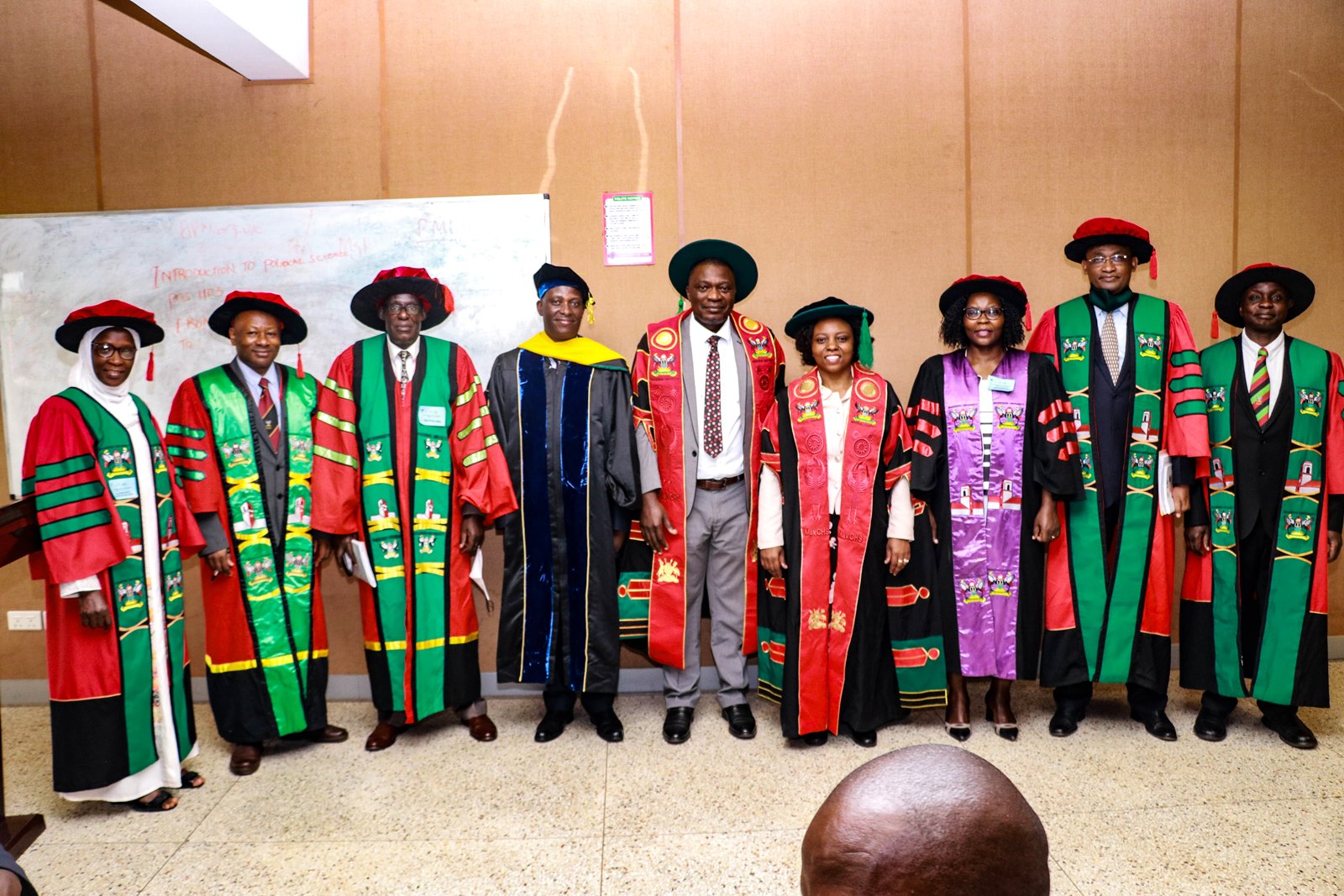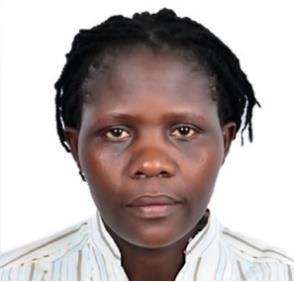Health
72nd Graduation: Doctoral Citations – CHS
Published
3 years agoon


AGABA Bekiita Bosco
Molecular Epidemiological Surveillance of pfhrp2 and pfhrp3 gene deletions in Plasmodium falciparum parasite populations in Uganda
Mr. AGABA Bekiita Bosco investigated the biological and molecular changes in malaria parasites that make them difficult to be detected in malaria infected individuals. Once these parasites evade detection, individuals remain untreated leading to severe disease and risk of mortality. The results provide the first large-scale evidence reporting the presence of pfhrp2/3 gene deletions in P. falciparum parasites in Uganda and demonstrated that gene deletions are not confined but rather spread across regions. Further, the study showed that these parasites emerge independently and sponteneously. The findings inform national guidelines for malaria case management and policy for the introduction and deployment of new malaria diagnotic tests. The study was funded by the NIH-Fogarty Malaria training grant and the WHO collaborating center in Australia. The work was supervised by Prof. Moses R. Kamya, Prof. Chae Seung Lim, Dr. Adoke Yeka and Dr. Samuel Nsobya.

AMONGIN Dinah
Understanding Trends and Trajectories of Repeat Adolescent Birth in Uganda
Ms. AMONGIN Dinah studied the magnitude and explanation for repeat adolescent birth (i.e. a second or higher order live birth before age 20 years, following a first birth before age 18 years) and its later life consequences in Uganda. Her results revealed high repeat adolescent births (over 1 in 2) with slight decline in the 30 years of observation (1988/89-2016) although more women over the years wanted to have this repeat birth later. Results suggest life-long negative socio-economic and reproductive health outcomes among women with repeat adolescent births compared to those without. Further, escalation of the socio-economic distress following first birth, domestic violence, and partner coercion, predisposed adolescent girls to sexual exploitation and unwanted marriages. Interventions should focus on preventing repeat adolescent pregnancy and increasing opportunities for adolescent mothers, with a primary focus on: improving school retention/continuation, strengthening family planning services, and preventing early marriage. This study was funded by Training Health Researchers into Vocational Excellence (THRiVE-2) and was supervised by Assoc. Prof Annettee Nakimuli, Assoc. Prof Lenka Benova, Assoc. Prof Lynn Atuyambe, and Assoc. Prof Claudia Hanson.

KAPAATA ANDAMA Anne
Genotypic And Phenotypic Characterization Of Hiv-1 Transmitted/Founder Viruses And Their Effect On Cytokine Profiles And Disease Progression Among Acutely Infected Ugandans
Ms. KAPAATA ANDAMA Anne looked at Genotypic and Phenotypic Characterization of HIV-1 transmitted/founder viruses and their effect on cytokine profiles and disease progression among acutely infected Ugandans. Subtype analysis of inferred transmitted/founder viruses showed a high transmission rate of inter-subtype recombinants (69%) involving mainly A1/D, while pure subtype D variants accounted for one- third of infections (31%). The signal peptide-C1 region and gp41 transmembrane domain were hotspots for A1/D recombination events. She documented diversity in the functional protein domains across the Gag-Pol region of the HIV virus and identified differences in the Gag-p6 domain that were frequently associated with higher in vitro replication. She also found that HIV-1 subtype D infections had higher concentrations of different cytokines than subtype Ainfections. cytokines IL-12/23p40 and IL-1α were associated with faster CD4+T cell count decline while basic fibroblast growth factor was associated with maintenance of CD4+T cell count above 350cells/microliter. This work was funded by the International AIDS Vaccine initiative and supervised by Prof. Pontiano Kaleebu, Eric Hunter and Moses Joloba and Dr Jesus Salazar Gonzalez.

BAKESIIMA Ritah
Modern contraceptive use among female refugee adolescents in northern Uganda: prevalence, effect of peer counselling, adherence and experiences
Ms. BAKESIIMA Ritah studied modern contraceptive use among female refugee adolescents northern Uganda: the prevalence, effect of peer counselling, adherence, and experiences. She found that the use of modern contraceptives among sexually active adolescents was very low with less than 10% using a method, and yet they wanted to delay child birth. This highlights a high unmet need of contraceptives in this population. She also found that peer counselling had a positive effect on acceptance of modern contraceptives; participants who received peer counselling were more likely to accept a contraceptive method compared to those who received routine counselling. The commonest reasons for non-acceptance of a method were partner prohibition and fear of side effects. She recommends that refugee adolescents, together with their partners, are further sensitized of the dangers of teenage pregnancy, and the benefits of contraception in preventing teenage pregnancy and associated complications. This research was funded by SIDA and supervised by Assoc. Prof Elin Larsson, Dr. Jolly Beyeza-Kashesya, Prof. Kristina Gemzell-Danielsson, Dr. Amanda Cleeve, and Dr. Rose Chalo Nabirye.

BAYIGGA Lois
Role of Vaginal Microbiome in Host Susceptibility of HIV Infection in Pregnant Ugandan Women: Inflammatory Response and Epithelial Barrier Integrity
Mr. BAYIGGA Lois investigated the virginal microbial diversity and its immune-modulatory effects on host susceptibility to HIV among pregnant women in Uganda. In the results, the vaginal microbiome of pregnant women in the cross-sectional study was categorised into four distinct cervicotypes. In conclusion, African women had a more diverse vaginal microbiome relative to women in the America and Europe as observed in the literature. This work was supervised by Prof. Damalie Nakanjako, Dr. David Patrict Kateete, Dr. Musa Sekikubo and Prof. Deborah Anderson.

MIJUMBI Deve Rhona
Rapid Response Services to Support Policymaking in Uganda
Ms. MIJUMBI Deve Rhona evaluated the rapid response mechanisms aimed at providing evidence for policymaking in Uganda, including their feasibility and establishment, their uptake amongst the users along with these users’ experiences with them. She was able to determine and confirm the feasibility of an RRS in Uganda and map the establishment, growth, and evolution of the service. She was also able to document the important factors that led to the establishment of the service, then used this information to develop a theoretical framework combining the structural and temporal components of the development of an RRS and the factors important at each stage. She also established the important factors that influence the uptake of the RRS amongst its actual and potential users and also explored the users’ experience with the rapid response (RR) briefs produced by the RRS and used her findings to improve these briefs. The findings from this work are important to enable the use of evidence for decision-making at different levels of governance globally, especially in complex situations where time is barred. The work was funded by the International Development Research Center’s International Research Chairs Initiative and supervised by Prof. Nelson Sewankambo, Prof. John Lavis, and Dr. Andrew Oxman.

MUKURU Moses
An analysis of evolutions in maternal health policies and implementation adaptations in Uganda during the MDG period (2000-2015)
Mr. MUKURU Moses analysed Uganda’s maternal health policies introduced during the fifteen years of the Millennium Development Goals (MDG period) to understand policy failure. This followed the persistence of high preventable maternal mortality, which closed at a Maternal Mortality Ratio (MMR) of 368 deaths per 100,000 live births in 2015 below the target of 131 deaths per 100,000 live births. While most studies explain the failure to achieve maternal health policy targets from epidemiological, interventional and health systems perspectives, this study examined how elite interests underpinning maternal health policies, policy design and implementation influenced maternal health policy failure in Uganda. The study found that the failure to achieve policy targets and persistence of high maternal mortality despite introducing fourteen policy shifts emanated from a complex interplay of factors at the policy formulation, design and implementation levels. Policy elites developed policies which mainly served their selfish political and economic interests while paying limited attention to the goal of reducing maternal mortality. The policy instruments introduced were incoherent, inconsistent and incomprehensive to cover all the causes of maternal mortality rendering the policies ineffective in design. Consequently, maternal health policies could not be fully operationalised at the frontline to support timely response to all the emergencies that cause maternal death. The study was funded by DAAD, the Alliance for Health Policy and Systems Research, Switzerland, through the University of Cape Town, South Africa, the “Support Policy Engagements for Evidence informed (SPEED)” and was supervised by Professor Freddie Ssengooba and Dr Suzanne Kiwanuka.

MUSABA Milton
Obstructed labour in Eastern Uganda: risk factors, electrolyte derangements, and effect of bicarbonate on obstetric outcomes
Dr. MUSABA Milton studied the risk factors, electrolyte derangements, and effect of bicarbonate on obstetric outcomes among women with Obstructed labour (OL). Failure of a woman to give birth normally is called OL. It is often associated with poor outcomes for both the mother and baby, if the intervention (surgical) is not timely. In Uganda, one in five maternal deaths and two in five perinatal deaths are attributed to OL. The risk factors were being a first-time mother, using herbal medicines, and being referred in labour. While being married, having a delivery plan, and an educated partner were protective. Perioperatively, multiple electrolyte derangements were common. Perinatal death was four times higher than the national average, and the predictors were being referred and having a high maternal blood lactate level. Sodium bicarbonate infusion had no significant beneficial or harmful effect. Developing birth and complication readiness plans may help to minimize delays and multiple referrals in case of an emergency. To minimize the effects of metabolic and electrolyte derangements in OL, healthcare providers need to ensure that these patients are well rehydrated especially during transfer to a higher facility. This study was funded by NORHED/NORAD and was supervised by Prof. Grace Ndeezi, Prof. Julius N. Wandabwa, Dr. Justus K. Barageine, and Prof. Andrew D. Weeks

NAMAZZI Gertrude
Burden and risk factors for child developmental disability among infants in Busoga region, in Uganda
Dr. NAMAZZI Gertrude investigated the burden and risk factors for child developmental disability among infants in Busoga region, in Uganda. The study revealed a high burden of child developmental disability at population level and among preterm babies. The caretakers of children with developmental disability expressed emotional stress and an impoverishing experience with limited support from the community and the health system. The key risk factors included: birth asphyxia, malnutrition, newborn infections, and a mother having more than three children. The study findings indicate the need to improve the quality of care during delivery and the postnatal period to prevent birth asphyxia, neonatal infections and malnutrition so as to curb the burden of child developmental disability. In addition, parents should limit the number of children to those they are able to nurture and care for adequately. The study recommends to government to improve the health facility readiness to respond to caretakers’ needs and the needs of children with developmental disability so as to empower families, while respecting their beliefs, to cope with adversity. The study was funded by SIDA and was supervised by Prof. James Tumwine, Assoc. Prof. Peter Waiswa and Assoc. Prof. Helena.

NANKYA Mutyoba Eron Joan
Hepatitis B. Among Ugandan pregnant women: Studies on Epidemiology, knowledge, perceptions and behavioural intentions
Ms. NANKYA Mutyoba Eron Joan investigated the epidemiology, knowledge, perceptions and behavioural intentions associated with Hepatitis B among Ugandan pregnant women. The study was conducted among pregnant women attending routine Antenatal Care in public health facilities in Kampala, Wakiso and Arua Districts. In the results, the overall prevalence of Hepatitis B. Virus infection was 6.1%. Pregnant women in Uganda have a high burden of the virus with significant regional differences, low knowledge and inaccurate perceptions of the virus. This study was funded by SIDA and was supervised by Assoc Prof. Ponsiano Ocama, Asoc Prof. Fredrick Makumbi and Assoc Prof. Lynn Atuyambe.

ODEI OBENG-AMOAKO Gloria Adobea
Retrospective analysis of concurrently wasted and stunted children 6-59 months in the outpatient therapeutic feeding programme in Karamoja: burden, characteristics, detection, response to treatment and outcomes
Ms. ODEI Obeng-Amoako Gloria Adobea examined the burden, characteristics and detection of concurrently wasted and stunted among children under 5 years, and their response to treatment and outcomes in the outpatient therapeutic feeding programme in Karamoja. She found that 5% of children under-5 years in Karamoja were wasted and stunted concurrently. Concurrent wasting and stunting was common among children younger than 3 years and particularly males. She identified optimal weight for age z-score (WAZ) and mid upper arm circumference (MUAC) thresholds for detecting children with concurrent wasting and stunting. Nearly half (49%) of children with severe acute malnutrition receiving outpatient therapeutic care were concurrently wasted and stunted and had lower recovery rate. The study will inform decision-making on integrated wasting and stunting prevention and treatment policy and programme. This study was funded by Carnegie Corporation of New York through RUFORUM, UNICEF Uganda; and African Union and European Union-Intra-ACP Mobility Partnering for Health Professionals Training in African Universities (P4HPT) and supervised by Assoc. Prof Charles A. S. Karamagi and Dr. Henry Wamani.
Browse Citations by College below:
< Director’s Message | CAES | CoBAMS | CoCIS | CEES | CEDAT | CHS | CHUSS | CoNAS | CoVAB | LAW | MUBS >
You may like
-


Simplicity, Service & Scholarship: Hallmarks of Professor Livingstone Luboobi’s Legacy
-


Strengthening Grants Management Through Institutional Collaboration and Capacity Building
-


Advert: Postgraduate Admissions 2025/26
-


Ugandan Study Flags Girls and Senior Students as a Mental Health High-Risk Group
-


Call for Applications: Responsible Conduct of Research (RCR) Training Course
-


Mak, HERS-EA Discuss Nurturing More Women Leaders
General
Strengthening Grants Management Through Institutional Collaboration and Capacity Building
Published
4 days agoon
July 15, 2025
As the funding to the higher education sector keeps on reducing due to competing priorities, universities are implored to come up with structures and strategies to attract and win research grants.
Key findings indicate that universities with institutionalized grant management offices, strong and coordinated research teams are better positioned to effectively compete for grants.
Makerere University, in partnership with Northwestern University, is spearheading the E-SMAC G11 Grants Administration and Management workshop from 14th to 17th July 2025, aimed at strengthening grant management offices and systems among the participating universities and entities.
It is envisioned that through this capacity building approach, the workshop which brings onboard over 130 participants from different universities and entities, will address the knowledge and skills gaps among faculty, grant managers, administrators and support staff.
The participating universities and entities include: Makerere University, Uganda Christian University-Mukono, Soroti University, Gulu University, Clarke International University, King Ceasor University, Kyambogo University, Muni University, Mother Kevin University, Uganda Martyrs’ University-Nkozi, Ernest Cook University, Mbarara University of Science and Technology, University of Kisubi, Kabale University, Busitema University, BRAC University, Infectious Diseases Institute, Ministry of Health, and among others.
Makerere University and Northwestern University have built a strong partnership over the past decade through academic exchange, collaborative research, and capacity building initiatives. “Since 2020, the institutions have deepened their collaboration in research administration through the UASP fellowship, sharing best practices and co-developing of sustainable systems to strengthen research management,” said Prof. Sylvia Antonia Nakimera Nannyonga-Tamusuza, Head of Grants Administration and Management Support Unit (GAMSU) at Makerere University.
She informed the participants that Northwestern University has been instrumental in building the capacity of staff at Makerere University in grants writing, management and administration.

Prof. Nannyonga-Tamusuza testified that when she was appointed to head GAMSU, she received comprehensive training from Northwestern University, which enhanced her competences and expertise in the field. She acknowledged Kate Klein from Northwestern University for the mentorship that empowered her with valuable knowledge and skills. She reported that five (5) members of staff from Makerere University had been trained by Northwestern University in grants and research management.
Filled with joy, she introduced the team of experts from Northwestern University namely Kate Klein, Bethany Ekesa and Elizabeth Christian to Makerere University, and applauded them for accepting to be facilitators. Prof. Nannyonga-Tamusuza assured the workshop participants that the team from Northwestern University would not only train them, but would share best practices in grants management and administration as well as networking opportunities.
The training workshop is part of the Expanded Strengthening of Makerere University’s Research Administration Capacity (E-SMAC) program, which focuses on enhancing research administrative systems and staff capacity at Makerere University and its partner institutions. Mordecai Tayebwa is the Program Director and Principal Investigator of the E-SMAC program being implemented from July 2024 to December 2025. The program is funded by the National Institute of Allergy and Infectious Diseases (NIAID).
The workshop provides a platform to build faculty, grant managers and administrators capacity in grant writing and management, foster cross-functional collaboration across departments, strengthen understanding of budget creation, biosketch and funder systems, encourage mentorship and peer to peer learning, and lay a foundation for regular support.
The training tackles four broader themes namely Grants Introduction and Systems, Proposal Development, Capacity Building, and Outcomes and Forward Planning. It covers vital areas such as grant writing, budgeting, funder systems, compliance, and overall grant administration. It features practical sessions, mentorship opportunities, and collaborative learning, with the goal of strengthening pre-award and post-award grant management and improving research productivity and compliance.

Opening the workshop, the Acting Deputy Vice Chancellor (Finance and Administration) at Makerere University, Prof. Winston Tumps Ireeta urged universities to institutionalize grant management offices and policies as well as strengthening research systems through collaborations.
Sharing his experience, Prof. Ireeta informed the participants that he was involved in the strategic discussion that led to the establishment of GAMSU at Makerere University. “We observed that Makerere University School of Public Health had established a grants office, which was instrumental in attracting and winning funds for research. We were inspired by this best practice. Thus, a comprehensive policy was developed to streamline and strengthen grants management across all colleges at the University,” he said.
Prof. Ireeta noted that Makerere University commits to being a research-driven institution, a strategic direction, that needs a strong funding base. ‘Research grants are therefore a key resource,” he said.
Stressing the importance of adhering to the technical details in the grants management processes, Prof. Ireeta appealed to the participants to be active listeners and maximally utilize the moment to learn from the experienced facilitators.

In the same vein, Prof. Nannyonga-Tamusuza, applauded the University Council and Management for the strategic direction undertaken to elevate GAMSU from a Unit to a Directorate. This points to the central role of the grants office in the life cycle of Makerere University. She pointed out that GAMSU reports to the Vice Chancellor through the Deputy Vice Chancellor (Finance and Administration).
Established by the University Council in 2020, GAMSU is a central office at Makerere University. It provides professional and coordinated services across the entire grant life-cycle-from identifying funding and developing proposals to ensuring compliance, project execution, financial oversight, and institutional capacity building. GAMSU works closely with academic and administrative staff to support competitive, well-managed and accountable research.
Focusing on the training workshop, Prof. Nannyonga-Tamusuza called upon the participants to utilize the golden opportunity to deepen their understanding of grants management in advancing research. She acknowledged the role of this collaboration in fostering mutual learning and the sharing of best practices, noting that such initiatives were key in ensuring that research conducted by universities aligns with global standards. She encouraged participants to engage fully in the workshop, collaborate with their peers, and build lasting connections to foster continuous learning.
The Administrative Director of the Havey Institute for Global Health at Northwestern University, Kate Klein, noted that grants administration goes beyond securing funding. She explained that grant administration is about building strong, sustainable systems that support researchers, facilitate collaboration, and ultimately contribute to solving global challenges.
Klein stated that grants administration and management require continuous learning, adaptability, and a strong foundation in regulatory and financial oversight.
“Collaborating and learning from one another is essential,” Klein stated. “When grants administration is effectively managed, it becomes a powerful catalyst for driving impactful change in research, ultimately advancing global initiatives that address the world’s most pressing challenges.”

She urged participants to critically analyze their current systems and identify areas where improvements could be made. By doing so, they would be better positioned to manage grants effectively and maximize their impact. She guided that a research grants administrator should be able to design monitoring frameworks, liaising with funders to address grant-specific issues, coordinating compliance, budgeting and reporting to ensure timely and effective implementation.
Presenting the Existing Support Systems and Principal Investigator (PI) agreements, Prof. Nannyonga-Tamusuza pointed out the critical role of GAMSU in maximizing Makerere University’s access to grants. This is particularly important in the context of limited financial resources, where GAMSU ensures that the university effectively leverages available funding opportunities.
Prof. Nannyonga-Tamusuza explained that GAMSU ensures research projects align with the priorities of funders and comply with both institutional and external regulations. She emphasized that this alignment is essential for securing and managing grants successfully. She stated that oversight offered by GAMSU, helps streamline the process for researchers. She pointed out that grant management is a collaborative process, involving multiple stakeholders across the university, which ensures that the necessary expertise and support are in place to manage grants effectively.
Underscoring the importance of grant negotiations, particularly with sub-award grants, Prof. Nannyonga-Tamusuza clarified that such negotiations are most successful when managed at the institutional level, where GAMSU oversees the entire lifecycle of a grant-from identifying funding opportunities to post-award activities.
Harriet Nambooze, the Project Coordinator at Makerere University School of Health Sciences, provided participants with a detailed guide on navigating the National Institutes of Health (NIH) grant application process. She introduced essential tools such as Grants.gov, eRA Commons, SAM.gov and the NATO Commercial and Government Entity (NCAGE), which are critical for applying and receiving an NIH award.

Nambooze stressed the importance of accurately setting up roles in the eRA Commons system, including Signing Official (SO), Principal Investigator (PI), Account Administrator (AA), and Administrative Official (AO), as well as ensuring that profiles are up-to-date across various systems.
She highlighted the necessity of adhering to NIH’s strict submission deadlines and maintaining active individual and institutional profiles to facilitate timely applications. She recommended that institutions should appoint multiple Signing Officials (SOs), to avoid any delays with the required submissions.
Presenting to the participants, Mordecai Tayebwa shared a detailed, step-by-step guide to starting a new grant application. He explained the key elements of the grant process, including the necessity of including a budget, adhering to specific formatting guidelines, and uploading required documents, such as the foreign justification for international projects.

He pointed out the need of thoroughly verifying the application before submission to ascertain that all required documents are included. “This step is crucial to avoid errors that could delay or jeopardize the submission,” he said.
The first day of the workshop set a strong foundation for enhancing grant administration capacity among the participating universities. Participants were equipped with knowledge and skills in grant systems at the national and global levels.
Day two, will focus on topics such as reading funding opportunity announcements, tailoring writing, budget development and justification, sub-contract management, sub-recipient monitoring, and Memoranda of Understanding (MoUs).
On Day three, the participants will gain a deeper understanding of the Grants Office, financial management, internal controls and reporting, peer review process overview and project closeout.
On Day four, the participants will witness the launch of the MakGAP (Makerere University Grants Professional Initiative), listen to a keynote speech on grants management from the Vice Chancellor of Makerere University, Prof. Barnabas Nawangwe, as well as presentations on professional growth through MakGAP, CRA Exam, and Global Research Administration Networks, and professional recognition of research managers and administrators in Africa and post evaluation.
The first day of the workshop set a strong foundation for enhancing grant administration capacity among the participating universities. Participants were equipped with knowledge and skills in grant systems at the national and global levels.
Day two, will focus on topics such as reading funding opportunity announcements, tailoring writing, budget development and justification, sub-contract management, sub-recipient monitoring, and Memoranda of Understanding (MoUs).
On Day three, the participants will gain a deeper understanding of the Grants Office, financial management, internal controls and reporting, peer review process overview and project closeout.
On Day four, the participants will witness the launch of the MakGAP (Makerere University Grants Professional Initiative), listen to a keynote speech on grants management from the Vice Chancellor of Makerere University, Prof. Barnabas Nawangwe, as well as presentations on professional growth through MakGAP, CRA Exam, and Global Research Administration Networks, and professional recognition of research managers and administrators in Africa and post evaluation.
Health
Ugandan Study Flags Girls and Senior Students as a Mental Health High-Risk Group
Published
7 days agoon
July 12, 2025
Based on research led by Max Bobholz and colleagues from Makerere University in Uganda, Essentia Institute of Rural Health, and the Medical College of Wisconsin in the United States.
Adolescence is meant to be a time of holistic growth and self-discovery, but for many Ugandan teenagers, this period is becoming a season of silent mental health struggles. A new study published in PLOS Global Public Health has uncovered a silent but growing crisis: nearly one in five Ugandan secondary school students in the study areas have signs of an emotional disorder. These conditions included anxiety, depression, post-traumatic stress disorder (PTSD), and adjustment disorders often involving excessive worry, sadness, fear, or mood instability. Also, one in 20 adolescents exhibited behavioral issues ranging from attention-deficit/hyperactivity disorder (ADHD) and oppositional defiant disorder to substance use and other risky behaviors like alcohol use.
The study, led by Max Bobholz, a PhD candidate in Public and Community Health at the Medical College of Wisconsin, surveyed a sample of 1,953 students aged 10 to 18 years enrolled in eight secondary schools in Iganga district in Eastern Uganda and Mukono district in Central Uganda. This was one of the most comprehensive efforts yet to understand the prevalence and drivers of mental health challenges among school-going Ugandan adolescents.
“We are looking at a generation facing a complex blend of stressors, namely, academic, social, and emotional,” says Bobholz. “Our findings show that certain groups are especially vulnerable, and schools need to be equipped to respond.”

This study results, published on June 12, 2025 was funded by the Swedish International Development Cooperation Agency (SIDA), a government agency of the Swedish Ministry for Foreign Affairs, through the Makerere University Postdoctoral Fellowship to one of the investigators, Dr. Catherine Abbo. Other researchers included Julia Dickson-Gomez, Arthur Kiconco, Abdul R. Shour, Simon Kasasa, Laura D. Cassidy, and Ronald Anguzu.
According to the study, girls bear a higher emotional burden. Researchers found that female students had nearly two times higher odds of suffering from emotional disorders such as anxiety or depression than their male peers.
Dr. Catherine Abbo, an Adolescent Psychiatrist and Associate Professor at Makerere University, attributes this to both biological and socio-cultural factors. “Puberty brings hormonal shifts that can heighten emotional sensitivity,” she explains. “But just as importantly, Ugandan girls often face intense pressure to conform to gender roles while also navigating issues like body image, harassment, and future uncertainty.” The researchers are calling for gender-sensitive mental health interventions, particularly in schools, where early support could help mitigate long-term mental health issues.

Higher associations in older teens?
Age also emerged as a key associated factor, with each additional year increasing the odds of behavioral disorders by 20%. “As adolescents grow older, they are more prone to risk-taking, impulsivity, and resistance to authority,” explains Dr. Simon Kasasa, a senior lecturer and biostatistician at Makerere University School of Public Health.

“Combine that with academic pressure and identity-related stress, and it’s no surprise we’re seeing more conduct issues in late adolescence,” Dr. Ronald Anguzu, an Assistant Professor in the Institute for Health and Humanity at the Medical College of Wisconsin, added. This study raises critical questions about whether and how Ugandan secondary schools support older students as they transition toward adulthood.
The unseen influence of family mental health
The study also found that adolescents with a family history of mental illness had twice the odds of exhibiting behavioral problems compared to those without such a history.
“This speaks to the intersection of genetics and environment,” says Bobholz. “Living in a household with people affected by mental illness can mean instability, stigma, and lack of emotional support, all of which weigh heavily on a developing mind.”
The authors recommend that school mental health screening include family mental health history and advocate for greater collaboration between education and health sectors to support at-risk households.

Private schools: High marks, higher stress?
Interestingly, students in private schools had 1.4 times the odds of experiencing emotional disorders compared to those in public schools. Private schools, often seen as academic havens, may inadvertently be cultivating high-pressure environments. “There’s an assumption that better facilities mean better well-being,” says Dr. Abbo. “But intense academic competition, social isolation, and a lack of trained counselors can create emotional pressure cookers.”
Previous research in 47 secondary schools across five districts (Rakai, Kyotera, Masaka, Lwengo, and Kalungu) in southwestern Uganda found that economic and family support helped reduce absenteeism among adolescent girls in secondary schools. However, this support did not significantly improve behavior or reduce grade repetition. The region, which includes districts like Rakai and Masaka, also faces a higher burden of HIV, adding to the challenges young people experience.
Meanwhile, a review of data from 42 primary schools in Luwero District identified school-based mental health interventions such as cognitive behavioral therapy and mindset-building approaches as being particularly effective. Researchers now suggest that integrating these strategies, along with efforts to reduce school violence, could go a long way in improving the mental health of Ugandan adolescents.
A-Level pressure: Academic ambition meets mental health strain
The study also found a correlation between advanced (A’level) education and increased risk of emotional disorders. “We selected one school district from each region based on population and past academic performance. As these students prepare for university or the job market, the pressure to succeed becomes enormous,” says Kasasa. “They’re facing a future full of uncertainty, with very little structured mental health support to help them cope.”

A wake-up call for Uganda’s education and health systems
The authors of this study assert the urgent need for school-based mental health programs, especially in private and A-level institutions. These programs should offer routine screening, emotional support, and training for teachers to recognize warning signs of mental health disorders.
Importantly, this study adds weight to calls for a national adolescent mental health policy, tailored to Uganda’s context, with interventions that bridge health, education, and social services.
“Our data shows that mental health challenges are not a fringe issue,” says Bobholz. “They are widespread, significant, and deeply tied to school, home, and society.”
The COVID-19 school closures between 2020 and 2022 deepened feelings of isolation and financial strain, with out-of-school adolescents reporting depression rates as high as 21.5% to 50% higher than their peers who remained in class, according to research published in February 2025. Yet Uganda invests less than 1% of its health budget in mental health, with just one psychiatrist per million people, leaving many teens to cope through cheap alcohol used by 28% of urban youth or untrained healers, as reported by the government paper The New Vision in April 2025. With only 26% of students completing lower secondary school and 35% of the population under age 24, these mental health challenges now pose a serious threat to the country’s future.
Mercy Akankunda of Proven Foundation, a Ugandan NGO supporting vulnerable groups, warns that mental health struggles are quietly eroding the well-being of the country’s youth, over 12 million strong and making up 35% of the population. “These teens are not just statistics. They are the future of Uganda, she asserts. If Uganda hopes to reap the dividends of its young population, addressing adolescent mental health must become and remain a national priority, not just for treatment, but for prevention, resilience, and hope.
Reference:
Bobholz, M., Dickson-Gomez, J., Abbo, C., Kiconco, A., Shour, A.R., Kasasa, S., Cassidy, L.D., & Anguzu, R. (2025). Correlates of behavioral and emotional disorders among school-going adolescents in Uganda. PLOS Global Public Health. Read the study here
Health
Call for Applications: Responsible Conduct of Research (RCR) Training Course
Published
1 week agoon
July 11, 2025By
Mak Editor
The Responsible Conduct of Research (RCR) Training Course, scheduled to take place from July 30th to August 1st, 2025, at the Makerere University College of Health Sciences’ Conference Room.
Background
The SUSTAIN: Advancing Makerere University Masters of Health Sciences in Bioethics program at Makerere University College of Health Sciences aims at developing and institutionalizing a mentorship program in research ethics that facilitates development of bioethics professionals and health researchers who are committed to the growth and application of research ethics in Uganda’s academic and research institutions to the highest possible degree. The Responsible Conduct of Research (RCR) course is one of the short courses that introduces trainees to a framework that involves application of established scientific, professional norms and ethical principles in the performance of all activities related to scientific research.
Course objectives
At the end of this course, trainees should be able to identify, manage and prevent research misconduct.
Course outline
Introduction to RCR; Introduction to Professionalism and Ethics; Human subject’s protection and regulatory framework in Uganda; Humane handling of animal research subjects; Conflict of interest;
Responsible laboratory practices; Mentor-mentee relationships; Collaborative research international, industry); Peer review; Research misconduct (including policies for handling misconduct); Community involvement during research in a low resource setting; Responsibility to society and environment; Responsible financial management; Data acquisition, management, sharing and ownership; Responsible authorship, publication and communication.
Target group
The Responsible Conduct of Research course is targeted at Researchers, Research administrators, Research assistants, Study coordinators, Graduate students and Student supervisors. Certificates will only be awarded to participants with 80% attendance.
Course fee: 205,000/=, or 56USD is payable.
The course fee will cater for meals and refreshments during the training period.
Payment & Registration procedure:
9030026194023, Stanbic Bank, Mulago, Makerere University Biomedical Research Center Limited
Dollar Currency:
9030026194147, Stanbic Bank, Mulago, Makerere University Biomedical Research Center Limited
Please Note: Share payment details on email/whatsup and a hardcopy deposit slip delivered on the first day of the training to Miriam Musazi, Department of anatomy, Bioethics Centre, Room C4,
Mob: +256 782 363 996/ +256 701 363 996, Email: mmusazi@gmail.com.
NB. Only those who will have paid by this date will be considered for the course
Venue: The training will take place at Makerere University College of Health Sciences’ Conference room
Trending
-

 General2 weeks ago
General2 weeks agoRe-advert: Admission to Undergraduate Programmes 2025/2026
-

 General1 week ago
General1 week agoRe-Advert for Applications for Diploma and Certificate Training
-

 General5 days ago
General5 days agoMakerere University Fees Waiver for 40 First Year Female Students 2025/2026
-

 General2 weeks ago
General2 weeks agoPress Statement on Ranking
-

 Health1 week ago
Health1 week agoCall for Applications: Responsible Conduct of Research (RCR) Training Course
